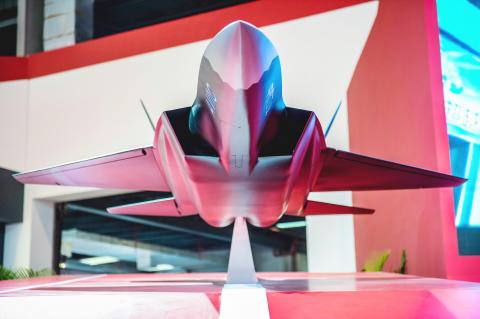China announced 50 new orders for its new Comac C919 passenger jet at the opening of the country’s main air show yesterday and looked set to assist in the rebirth of one of the most famous names in aviation — defunct US carrier Eastern Air Lines.
The dozens of new orders for China’s first large commercial passenger jet were seen dominating the first day of the China International Aviation and Aerospace Exhibition, held every two years in the southern city of Zhuhai, along with fresh evidence of China’s military ambitions.
The latest orders for the 150-seat plane will boost the official total to 380, reaching the state-owned manufacturer’s declared breakeven point of 300 to 400 orders. However, Western analysts say it will be some time before the aircraft, due to make its maiden flight in 2014, proves its viability.

Photo: AFP
The C919 is designed to challenge Airbus SAS and Boeing Co in the largest segment of the US$100 billion annual jetliner market.
Commercial Aircraft Corp of China (COMAC, 中國商用飛機) yesterday said it would sign orders for 20 aircraft each with Joy Air and Hebei Aviation Group, confirming a Reuters report of buying interest from the two Chinese regional carriers.
Its only foreign customer, GECAS, a unit of General Electric Co which co-produces the engines, will buy 10 more, taking its total order for the plane to 20, COMAC said in a statement.

Photo: Reuters
Other potential C919 customers that have already signed tentative agreements include Irish low-cost carrier Ryanair and British Airways, COMAC said.
COMAC also confirmed it would sign a provisional agreement with investors representing Eastern Air Lines, which went bankrupt in 1991. There have been sporadic reports of efforts to relaunch the airline, whose forked logo was seen on display as a backdrop to the signing ceremony due later yesterday.
Once led by former World War I ace Eddie Rickenbacker and later by former Apollo astronaut Frank Borman, Miami-based Eastern Air Lines rose to become one of the largest airlines in the world before losing a battle against low-cost competition.
The air show — attended by a record 650 exhibitors — also featured prototypes of a new Chinese business aircraft and a model of a new stealth fighter China hopes to build for export.
Industry publication Aviation Week noted the model bore a “striking resemblance” to an aircraft recently photographed flying from the Shenyang Aircraft factory, which captured worldwide interest from military analysts and publications.
Separately, Airbus said it expects to build the planned A320neo jet in China, as the planemaker holds discussions about extending the life of its first assembly line outside Europe.
The company is in talks with partners about operating the Tianjin, China, facility through 2025, Airbus’ China head Laurence Barron said yesterday at a press briefing. The factory already makes the current A320 model.
“We can expect to see the neo being assembled here in China in the near future,” Barron said.
The aircraft is due to enter service in 2015. Airbus also builds A320s in France and Germany, and is planning to open a factory in Alabama in the US.
Barron also said the EU’s decision to suspend the introduction of emissions levies on foreign carriers is positive for Airbus in China. The country had been among nations opposing the EU plan because of sovereignty and cost concerns.

Intel Corp chief executive officer Lip-Bu Tan (陳立武) is expected to meet with Taiwanese suppliers next month in conjunction with the opening of the Computex Taipei trade show, supply chain sources said on Monday. The visit, the first for Tan to Taiwan since assuming his new post last month, would be aimed at enhancing Intel’s ties with suppliers in Taiwan as he attempts to help turn around the struggling US chipmaker, the sources said. Tan is to hold a banquet to celebrate Intel’s 40-year presence in Taiwan before Computex opens on May 20 and invite dozens of Taiwanese suppliers to exchange views

Application-specific integrated circuit designer Faraday Technology Corp (智原) yesterday said that although revenue this quarter would decline 30 percent from last quarter, it retained its full-year forecast of revenue growth of 100 percent. The company attributed the quarterly drop to a slowdown in customers’ production of chips using Faraday’s advanced packaging technology. The company is still confident about its revenue growth this year, given its strong “design-win” — or the projects it won to help customers design their chips, Faraday president Steve Wang (王國雍) told an online earnings conference. “The design-win this year is better than we expected. We believe we will win

Chizuko Kimura has become the first female sushi chef in the world to win a Michelin star, fulfilling a promise she made to her dying husband to continue his legacy. The 54-year-old Japanese chef regained the Michelin star her late husband, Shunei Kimura, won three years ago for their Sushi Shunei restaurant in Paris. For Shunei Kimura, the star was a dream come true. However, the joy was short-lived. He died from cancer just three months later in June 2022. He was 65. The following year, the restaurant in the heart of Montmartre lost its star rating. Chizuko Kimura insisted that the new star is still down

While China’s leaders use their economic and political might to fight US President Donald Trump’s trade war “to the end,” its army of social media soldiers are embarking on a more humorous campaign online. Trump’s tariff blitz has seen Washington and Beijing impose eye-watering duties on imports from the other, fanning a standoff between the economic superpowers that has sparked global recession fears and sent markets into a tailspin. Trump says his policy is a response to years of being “ripped off” by other countries and aims to bring manufacturing to the US, forcing companies to employ US workers. However, China’s online warriors